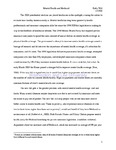Mental Health and Medicaid

View/
Author
Will, Kelly
Subject
Washington and Lee University, Shepherd Poverty Program
Capabilities approach (Social sciences)
Medicaid
Mental health insurance
Depression, Mental -- Treatment
Poverty
Cognitive therapy
Anxiety disorders
Anxiety -- Treatment
Social workers -- Training of
Metadata
Show full item recordDescription
Kelly Will is a member of the Class of 2008 of Washington and Lee University. Capstone; [FULL-TEXT FREELY AVAILABLE ONLINE] Medicaid covers 15 million adults representing 25% of all Medicaid recipients and 5% of America's population (KFF). The effects of poverty make Medicaid recipients significantly more likely to suffer from mental illness. Mental health care is essential to get the most out of those 15 million adults and help move people out of poverty. Legislation over the past decade has helped but a lot more can be done. Even states like North Carolina, which was cited by Health Affairs as a state to watch for dealing with spending cuts while maintaining higher quality care, are still woefully deficient in reaching Medicaid recipient's with mental illnesses. North Carolina's penetration rate is one of the highest of all states and yet is only 2.9%. In order to improve mental health coverage there needs to be education for social workers and physicians, national standards, an emphasis on acute care, and more providers. [From Recommendations section]